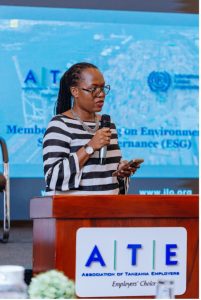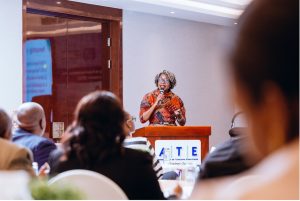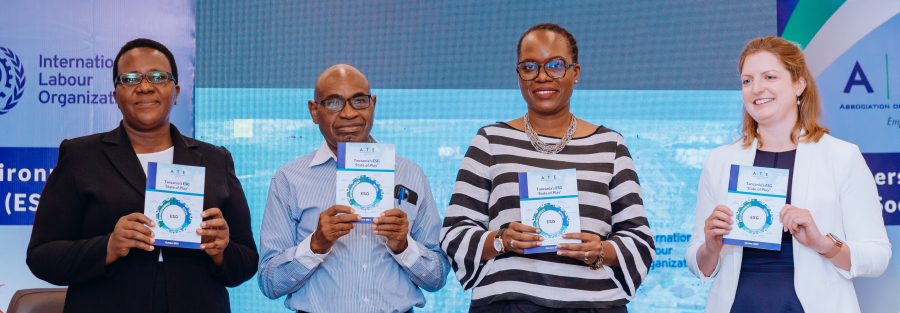Dar es Salaam – The Association of Tanzanian Employers (ATE) presented Tanzania’s ESG ‘State of Play’ Report
On October 18, the Association of Tanzanian Employers (ATE), supported by the International Labour Organization (ILO), presented its ESG ‘State of Play’ Report, reflecting the current state of Environmental, Social, and Governance (ESG) practices in Tanzania and providing a foundation from which to advance thanks to forward-looking recommendations. The event, held in Dar es Salaam, brought together over 100 participants, including ATE members from across various sectors, representatives from the ILO, the National Environment Management Council (NEMC), and the Trade Union Congress of Tanzania (TUCTA)

In her opening remarks, ATE’s Chief Executive Officer, Suzanne Ndomba-Doran, presented the business case for ESG. She explained that “ESG is not just a trend but a necessity for the future of business. ESG encompasses the essential factors in measuring the sustainability and social impact of an investment in a company or business. It is a framework that allows us to evaluate how our organizations manage risks and opportunities related to environmental, social, and governance criteria. As corporates, we have the responsibility and the power to shape a sustainable future.”

Expert consultant Nawaka Omari presented the Tanzania ESG ‘State of Play’ report, which was developed in collaboration with the ILO’s Bureau for Employers’ Activities (ACTEMP). The report was created to provide a comprehensive overview of the current level of understanding and awareness of ESG among Tanzanian companies across various sectors, aiming to identify how ATE can play a pivotal role in promoting and disseminating ESG practices throughout the business community.

Drawing on data from 10 key revenue-generating sectors, the report revealed that many Tanzanian companies struggle to integrate ESG as a unified framework. Businesses often approach the environmental, social, and governance components separately, rather than seeing them as interconnected pillars. This fragmented approach points to the need for a significant cultural shift in how companies perceive and implement ESG. The absence of policy frameworks that address ESG holistically further complicates the adoption of cohesive practices.
Larger companies, particularly multinationals, have embraced ESG standards more robustly than smaller, local businesses. This trend is most evident in sectors subject to stricter sustainability regulations, such as agriculture, extractives, financial services, tourism, and manufacturing. In contrast, other sectors and smaller companies have been slower to integrate these principles into their operations meaning they may be missing out on its benefits.
The report underscored several key recommendations, starting with the importance of ensuring that Tanzania’s regulatory framework facilitates ESG adoption in a way that is both meaningful in the national context and supportive of companies, avoiding unnecessary burdens. Developing local ESG reporting guidance that reflects the specific needs and realities of Tanzanian businesses will be crucial. In addition, the report called for practical guidelines to help companies incorporate ESG into their operations, coupled with capacity-building programmes to support sectors most affected by ESG demands.
Beyond regulatory changes, the report highlighted the importance of fostering a mindset shift within the business community. To make ESG an integral part of business operations rather than an optional addition, companies need clearer guidance on how to align ESG with existing frameworks, such as the Sustainable Development Goals (SDGs), which many organizations already use. Additionally, actively involving worker and employer organizations in the ESG disclosure process will be crucial for ensuring transparency and accountability in implementing these practices.
Looking ahead, ATE is set to play a central role in advancing ESG practices in Tanzania. The association will continue to conduct research, collaborate with think tanks, advocate for ESG-friendly policies, and provide training to raise awareness and share best practices with Tanzanian companies.
The event signified the beginning of a more structured and consistent effort to integrate ESG across Tanzanian businesses, laying the groundwork for a future where sustainable and responsible corporate practices become the norm.

To access the full report, click here.

